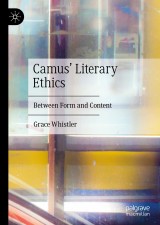Details

Camus' Literary Ethics
Between Form and Content|
CHF 100.50 |
|
| Verlag: | Palgrave Macmillan |
| Format: | |
| Veröffentl.: | 25.01.2020 |
| ISBN/EAN: | 9783030377564 |
| Sprache: | englisch |
Dieses eBook enthält ein Wasserzeichen.
Beschreibungen
<p></p><p>This book seeks to establish the relevance of Albert Camus’ philosophy and literature to contemporary ethics. By examining Camus’ innovative methods of approaching moral problems, Whistler demonstrates that Camus’ work has much to offer the world of ethics— Camus does philosophy differently, and the insights his methodologies offer could prove invaluable in both ethical theory and practice. Camus sees lived experience and emotion as ineliminable in ethics, and thus he chooses literary methods of communicating moral problems in an attempt to draw positively on these aspects of human morality. Using case studies of Camus’ specific literary methods, including dialogue, myth, mime and syntax, Whistler pinpoints the efficacy of each of Camus’ attempts to flesh-out moral problems, and thus shows just how much contemporary ethics could benefit from such a diversification in method.<br></p><p></p>
Chapter 1: Introduction: Context, Form, and Content<div>Chapter 2: A Post-Christian Ethics</div><div>Chapter 3: Narrating the Absurd</div><div>Chapter 4: Myths, Fables, Parables, Allegories</div><div>Chapter 5: Dialogic Ethics</div><div>Chapter 6: Absurd Theatre: Caligula and Beyond</div><div>Chapter 7: A Novelistic Afterlife</div><div>Chapter 8: Conclusion: Ethics Through Interdisciplinarity</div>
<b>Grace Whistler</b> gained her PhD in Philosophy at the University of York. She has published articles in numerous journals including Literature and Theology and the Journal of Life Writing, as well as having written the chapter on ‘The Absurd’ for Brill’s Companion to Albert Camus. <br>
<p>This book seeks to establish the relevance of Albert Camus’ philosophy and literature to contemporary ethics. By examining Camus’ innovative methods of approaching moral problems, Whistler demonstrates that Camus’ work has much to offer the world of ethics— Camus does philosophy differently, and the insights his methodologies offer could prove invaluable in both ethical theory and practice. Camus sees lived experience and emotion as ineliminable in ethics, and thus he chooses literary methods of communicating moral problems in an attempt to draw positively on these aspects of human morality. Using case studies of Camus’ specific literary methods, including dialogue, myth, mime and syntax, Whistler pinpoints the efficacy of each of Camus’ attempts to flesh-out moral problems, and thus shows just how much contemporary ethics could benefit from such a diversification in method.<br></p>
<p>Analyses a wealth of diverse critical approaches to philosophical style and form</p><p>Provides an in-depth account of Camus' distinctive vision of the role of fiction in provoking moral reflection</p><p>Examines the particular rhetorical techniques and forms of discourse utilised by Camus in order to provoke reflection in the reader</p>
Diese Produkte könnten Sie auch interessieren:

Karl Schuhmann, Selected papers on phenomenology

von: Karl Schuhmann, Cees Leijenhorst, Piet Steenbakkers

CHF 177.00















